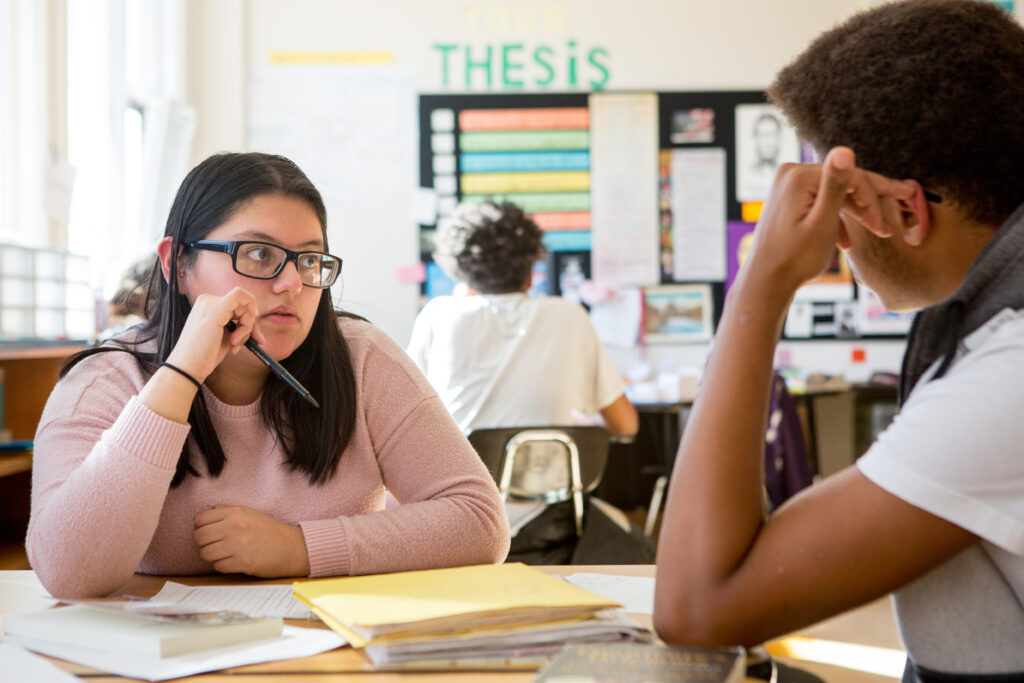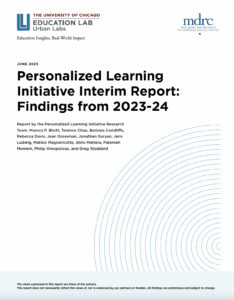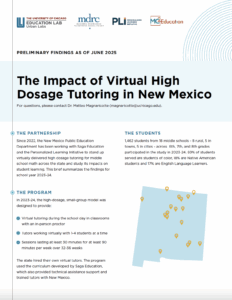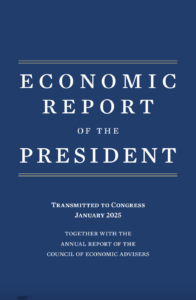Unlocking Literacy Potential: Bridging the Gap for High School Readers

In 2020, the Education Lab partnered with Chicago Public Schools (CPS) to rigorously design, test, and scale the impact of its Structured Literacy program on students’ reading proficiency levels.
Project overview
The Challenge
Literacy skills, essential for unlocking a child’s full potential, have a well-established link to long-term life outcomes. Children who read at grade level are more likely to graduate high school, have more career prospects, and earn higher incomes in the future (The Annie E. Casey Foundation, 2010, 2013; Kamil et al., 2008; Snow et al., 1998). Despite some progress, as of 2022, 39% of CPS students still lack basic reading proficiency upon entering 9th grade according to 2022 NAEP data. This unacceptable reality calls for effective intervention, starting with an understanding of why students progress so far in their education without mastering this fundamental skill.
One primary reason students may struggle with literacy proficiency in adolescence is because they are never taught evidence-based strategies to master English comprehension – what is now commonly known as the science of reading. Early literacy curricula often fail to provide explicit and systematic instruction in “decoding and encoding text,” or the process of understanding letters, sounds, and word creation to write. Students in these environments may rely on memorizing whole words to learn to read, a strategy that initially works but becomes ineffective around fourth grade when the number and complexity of words increase.
Years Active
2020 – present
Topics
Project Leads
Monica Bhatt
Senior Research Director

Fatemeh Momeni
Research Director

As of 2022, 39% of CPS students still lack basic reading proficiency upon entering 9th grade, according to 2022 NAEP data.
Without early instruction in phonemic skills like word sounding in K-3, students frequently miss out on it in their later education. Assuming kids already have this fundamental skill, middle and high school English Language Arts (ELA) classes focus on reading comprehension rather than reading accuracy and fluency. This leads students to get to high school with a mistaken belief that they are unable to read. Consequently, they miss out on content across subjects like ELA, science, and social studies that require solid reading comprehension.
Unlocking this skill could significantly broaden students’ horizons.
However, there is a lack of suitable curricula for teaching phonemic awareness to high schoolers. The few interventions available often make them feel stigmatized by having to use materials designed for much younger children. There are also very few known effective interventions to support high schoolers’ basic literacy development. Fortunately, our prior research shows that high school is not too late to effectively intervene and boost student learning (Guryan, et al., 2022). The CPS Structured Literacy course emerges as a promising approach for equipping high school students with the literacy strategies and skills they missed in their early education.
The Plan
The CPS Structured Literacy course engages youth who fall below the 25th percentile in reading proficiency in a robust reading intervention that focuses on decoding and encoding text coupled with reading age-appropriate and culturally relevant texts. Developed by the CPS Department of Literacy, the Structured Literacy course combines different evidence-based practices using the Wilson Reading System (WRS). The program’s structured lesson plan allows any trained adult, even those who are not trained literacy specialists, to facilitate reading skill development in a high school setting.
The Structured Literacy program is personalized to students’ needs and diverse strengths, considering their lived experiences. It provides daily opportunities for students to read culturally relevant texts at their level, augmenting skill-based reading curriculum with age-appropriate general texts to enhance youth engagement. Students with similar literacy needs are grouped together and receive instruction in tandem throughout the year, earning course credit as part of their high school schedule. This model aligns with the successful high-dosage tutoring in CPS, featuring small-group, individualized instruction in a separate class period, using a structured curriculum that any trained adult can deliver.
In 2020, the Education Lab partnered with CPS to rigorously evaluate the program’s impact on students’ educational outcomes through a multi-year randomized controlled trial (RCT). While CPS is keen on expanding the Structured Literacy course to schools throughout the district, the decision to scale the intervention hinges on credible evidence of its efficacy provided by the research evaluation. Should the program prove effective, it could be adopted by school districts and educators nationwide.
The University of Chicago Education Lab has enrolled over 1,700 students across schools from 2020-2023.
To complete the evaluation, the research team plans to continue working with CPS, enrolling study participants for an additional year in school year 2023-24, followed by a year of analysis. Support for this effort will allow the research team to complete their evaluation of the Structured Literacy program, providing CPS with robust evidence to decide on scaling this promising intervention. Support will also aid schools in expanding their current capacity for Structured Literacy services, offering more literacy support to students in need and helping them strengthen their reading skills.
Project Partners
Chicago Public Schools

Personalized Learning Initiative Interim Report: Findings from 2023-24
The latest report by the PLI research team shows positive impacts from many types of tutoring–both more and less expensive tutoring models–across the country. These interim findings ought to encourage the field to stay the course in implementing high dosage tutoring, while improving dosage to yield greater learning gains for students.

The Impact of Virtual High Dosage Tutoring in New Mexico
Since 2022, the New Mexico Public Education Department has been working with Saga Education and the Personalized Learning Initiative to stand up virtually delivered high dosage tutoring for middle school math across the state and study its impacts on student learning. This brief summarizes the findings for school year 2023-24.

2025 Economic Report of the President
This report cites results from the Education Lab’s study of a high-dosage tutoring model–what we call “Saga Technology”–which found that substituting some tutor time with educational technology can reduce costs by one-third and halve the number of tutors needed without compromising effectiveness.

Briefing for Chicago Public Schools Elected School Board Candidates
The Education Lab hosted a series of briefings for Chicago Public Schools’ elected school board candidates to provide practical tools and show how school board members can effectively use data to shape policy and improve student success.
